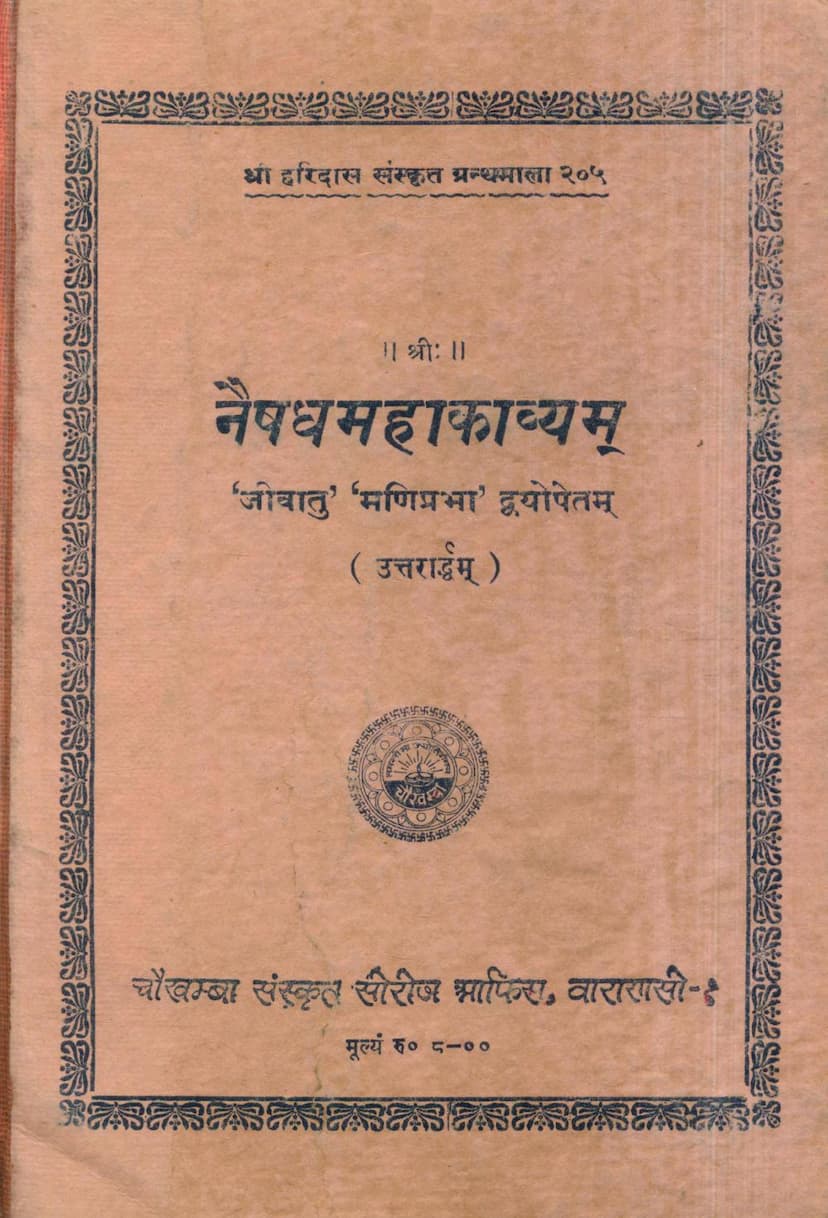Naishadh Mahakavyam Uttararddham
Added to library: September 2, 2025

Summary
The provided text is the "Uttararddham" (Second Part) of the "Naishadh Mahakavyam," authored by Hargovinddas Shastri and published by Chaukhambha Sanskrit Series Office. It is a commentary on the epic poem "Naishadh MahakAvyam" originally composed by Mahakavi Shri Harsha. The specific volume under discussion is the second part, and it includes commentaries titled "Jivatu" by Mallinath and "Maniprabha" in Hindi by Pandit Hargovind Shastri. The catalog link provided leads to Jainqq.org, indicating a Jain connection to the exploration of this text, though the core content is a commentary on a classical Sanskrit epic, not a direct Jain scripture.
The provided pages focus on the Twelfth (12th) Canto (Sarga) of the Naishadha Mahakavya. The summary below details the content covered in the provided text, which appears to be a verse-by-verse explanation and translation of this canto.
Summary of the Provided Text (Naishadh Mahakavyam Uttararddham - 12th Canto Commentary):
The twelfth canto of the Naishadha Mahakavya, as presented through the commentary, describes the events following the arrival of various kings for Damayanti's Swayamvara. The text meticulously explains each verse, providing literal translations, grammatical breakdowns, explanations of rhetorical devices (Alankaras), and occasional mythological or historical context.
Here's a breakdown of the key themes and events as conveyed in the text:
-
Arrival of Kings (Verses 1-3):
- The canto begins with the arrival of kings from various regions, described as coming with their magnificent chariots. These kings, though arriving late due to the allure of their beloveds, are noted for their excellent chariots.
- The text delves into the nuances of the Sanskrit words used, explaining their meanings and grammatical constructions. For instance, it breaks down the meaning of "Vilambam Aalambya" and the implications of "Avilaḥ Kalushāḥ".
- The arrival of Damayanti to the assembly is described. The text highlights the beauty and presence of Damayanti, emphasizing the anticipation and impact of her arrival on the assembled royalty.
- The manner of Damayanti's presentation to the court is detailed, including her palanquin and the subtle gestures that convey her intentions or state of mind. The commentary explains the actions of the palanquin bearers and how they conveyed messages.
-
Description of Kings and Their Qualities (Verses 4-11, focusing on King Rituparna):
- The text then transitions to a detailed description of specific kings present at the Swayamvara, focusing on their lineage, virtues, and prowess.
- A significant portion is dedicated to King Rituparna of the Ikshvaku dynasty. The commentary highlights his exemplary qualities, including:
- His lineage and ancestry: Described as glorious, connected to great kings of the past, and possessing immense valor.
- His fame and power: The text elaborates on his widespread reputation, his ability to overcome adversaries, and the vastness of his kingdom extending to the seas.
- His devotion and character: Mention is made of his dedication to dharma and his virtuous nature, which even pleased the gods.
- His intellect and administrative skills: The commentary touches upon his wisdom and the prosperity of his kingdom.
- His physical attributes and demeanor: While not explicitly detailed in this section, the general descriptions suggest a regal and impressive presence.
- The verses often employ elaborate metaphors and similes to praise these kings, comparing them to celestial beings, natural phenomena, and mythical figures. The commentary dissects these literary devices.
-
Damayanti's Observation and Selection Process (Implied throughout):
- While the focus is on the kings, the underlying narrative is Damayanti's selection of her groom. The commentary subtly hints at the reasons why certain kings might be favored or disfavored based on the descriptions provided.
- The text explains the significance of the poetic language used, such as the use of Utpreksha (supposition) and other figures of speech to enhance the portrayal of grandeur and divine favor.
-
The Role of Saraswati:
- The goddess Saraswati appears to be involved in the proceedings, guiding the events or speaking about the kings, as indicated by references to "Saraswati Girah" (words of Saraswati).
-
Specific Examples of Praise:
- The commentary provides detailed explanations of verses that praise kings for their courage, generosity, and adherence to dharma. For instance, verses are analyzed for their use of anupraasa (alliteration) and other sound-based figures of speech.
- The verses often use hyperbole to describe the kings' virtues, indicating their immense power and righteousness.
-
The Narrative Progression:
- The canto seems to progress through the presentation and evaluation of various kings before likely moving towards the climax of the Swayamvara where Nala (and potentially other disguised gods) would be presented.
Overall, the provided text offers a rich and detailed commentary on the 12th canto of Naishadha Mahakavya, focusing on the majestic arrival of kings for Damayanti's Swayamvara, with a particular emphasis on the virtues and grandeur of King Rituparna. The commentary by Shastri provides linguistic, grammatical, and literary insights into the original Sanskrit text.